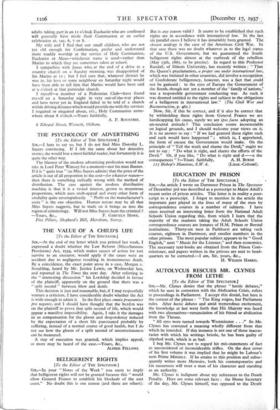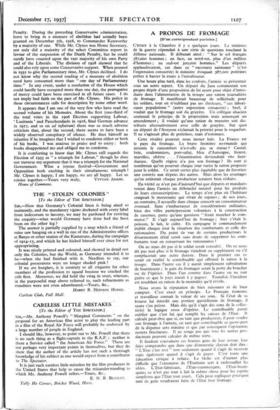AUTOLYCUS RESCUES MR. CLYNES FROM LETHE [To the Editor of
THE SPECTATOR.] Sm,—Mr. Clynes denies that the phrase " hectic debates," which he uses in connexion with the Abdication Crisis, refers to proceedings in Parliament. I accept this denial, but here is the context of the phrase : " The King reigns, but Parliament rules. After hectic debates and amid tremendous excitement, the knowledge at last went forth that His Majesty was faced with two alternatives--renunciation of his friend or abdication from the Throne.
" All eyes were turned towards Westminster . . ." So Mr. Clynes has conveyed a meaning wholly different from that which he intended. If this instance is not one of those inaccu- racies with which his writings bristle, he has been guilty of slipshod work, which is as bad..
I beg Mr. Clynes not to regard his mis-statements of fact as unconsidered or inconsiderable trifles. On the dust cover- of his first volume it was implied that he might be Labour's next Prime Minister. If he attains to this position and subse- quently writes more Memoirs, both his contemporaries and his successors will treat a man of his character and standing as an authority.
Mr. Clynes is indignant about my references to the Death Penalty. Here are some relevant facts : the Home Secretary of the day, Mr. Clynes himself, was opposed to the Death Penalty. During the preceding Conservative administration, leave to bring in a measure of abolition had actually been granted on December 5th, 1928, to Commander Kenworthy by a majority of one. While Mr. Clynes was Home Secretary, not only -did a majority of the select Committee report in favour of the suspension of the Death Penalty, but he could surely have counted upon the vast majority of his own Party and of the Liberals. The division of 1928 showed that he could also rely upon some Conservative support. When pressed in 1931 to give Parliamentary time, Mr. Clynes declined. I do not kriow why the second reading of a measure of abolition need have consumed more than " one day of Parliamentary time." In any event, under a resolution of the House which could hardly have occupied more than one day, the prerogative of mercy could have been exercised in all future cases. I do not imply bad faith on the part of Mr.- Clynes. His policy in these circumstances calls for description by some other word.
It appears that I am one of the very few who have read the second volume of his Memoirs. About the first (one-third of the total votes in the 1906 Election supporting Labour,
Lusitania ' and Passchendaele in 1916, final German advance. in 1917, and so on ad infinitum) there was so much adverse criticism that, about the Second, there seems to have been a widely observed conspiracy of silence. He does himself an injustice if he imagines that I wished to condemn either or both of his books. I was anxious to praise and to enjoy : both books disappointed me and obliged me to condemn.
It is comforting to know that Mr. Clynes still regards the Election of 1935 as " a triumph for Labour," though he does not traverse my argument that it was a triumph for the National Government. What a joyous festival—Government and Opposition both exiliting in their simultaneous triumph ! Mr. Clynes is happy, I am happy, we are all happy. Let us rejoice together.—Yours very truly, VYVYAN ADAMS. House of Commons.















































 Previous page
Previous page